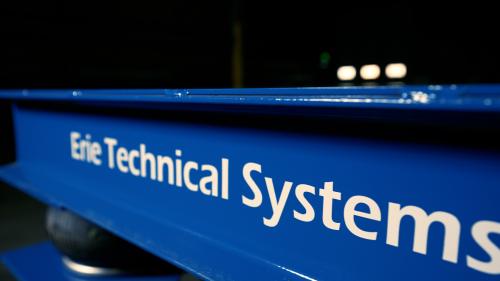Dry bulk goods are incorporated into a seemingly endless array of products in today's ever-increasingly industrialized world. This has put bulk material handling companies in high demand.
From design and fabrication to testing and shipping, careers centered around dry bulk material handling equipment have become more and more important – even with the advent of automation and technological solutions.
This article takes a close look at the primary career paths related to the machine manufacturing and dry bulk industry.
Bulk Material Handling Systems Companies – What Are The 4 Main Career Categories?
Jobs within the bulk material handling industry fall into four main categories. Read on to investigate each one!
Engineering and Design Careers in Bulk Material Handling Companies
Although engineers and designers are commonly viewed as the starting point of the development of mechanical systems, the truth is that their reach often needs to extend throughout the entire process.
The job titles are incredibly varied but here are a few examples of the most common ones you may come across in the dry bulk industry:
- Project Engineer
- Mechanical Designer/Engineer
- Manufacturing Engineer
- Structural Designer
- Equipment Asset Engineer
Roles, Duties, and Required Skills
Engineers and designers are responsible for the conception and planning of all of the bulk material handling systems a company will eventually create and distribute. Additionally, they have to be able to provide further support in the form of installation instructions and other types of design information.
Here are some key duties engineers and designers will generally be responsible for in the machine manufacturing industry:
- Handling (or overseeing) the formulating and planning of original bulk material handling systems.
- Adapting existing designs, schematics, and blueprints to meet the needs of contemporary manufacturers.
- Finding the best solutions for effective and efficient equipment integration with bulk material handling systems – balancing productivity and budgetary constraints.
- Applying feedback from fabrication experts and quality control technicians to isolate issues with existing designs and develop fixes/improvements.
Along with formal certification, here are some examples of skills and abilities that are useful for engineers and designers in this industry:
- A high level of written and verbal communication skills, as well as the ability to convey designs to general audiences.
- The ability to utilize 3D modeling software to facilitate the design of complex machinery.
- The flexibility to alter plans and designs to meet the needs of specific clients or comply with changes in industry standards.
- Attention to detail and an innate focus on efficiency and accuracy.
Fabrication and Assembly Careers in Bulk Material Handling Companies
The next logical step after machinery has been fully conceptualized and designed is for it to be created – putting together all of the individual parts to make a functioning whole.
Due to technological advancements in the dry bulk industry (among others) and also increasing levels of automation, fabrication, and assembly, job opportunities have seemingly dwindled over the past few decades.
Many companies, however, still require fabrication and assembly experts who can work with complex robotics and automated systems to bring their designs to life.
Roles, Duties, and Required Skills
Individuals in fabrication and assembly careers work with a mixture of manual labor and automated systems. Here are some key duties they will generally be responsible for:
- The utilization of complex robotics and automated systems to fabricate and assemble parts.
- Positioning or aligning machinery parts or components through the use of robotic hoists or manually.
- The calibration of machinery – or individual parts – to meet company/industry standards.
In addition to having certification in a relevant field of study, here are some examples of skills and training experience that are useful for fabrication and assembly experts:
- The ability to use hand tools to assemble parts.
- The ability to read and understand assembly instructions, schematics, and complex blueprints.
- The ability to verify predetermined specifications by measuring fabricated parts or completed machinery.
- Considerable levels of hand-eye coordination and dexterity, especially when needing to oversee or directly handle the assembly of small and intricate parts.
- The ability to utilize analog or digital control systems to facilitate working in tandem with automated robotics.
- The physical stamina (and strength) to perform manual assembly tasks if the need arises.
It is worth noting that fabrication and assembly experts usually work closely with testing and quality control experts. In fact, in the manufacturing of dry bulk handling material equipment, it is not uncommon to see a considerable amount of back and forth between both parties – or even both parties handling some of the same work tasks.
Testing and Quality Control Careers in Bulk Material Handling Companies
Departments that deal with aspects like testing and quality control are crucial to making absolutely sure a product is perfect before it is shipped. Here are some common titles you may see for testing and quality control careers with dry bulk material handling companies and equipment manufacturers:
- Quality Control Technicians/Associates
- Manufacturing Test Engineers
- Mechanical Testing Engineers
- Quality Control Stability Coordinators
Roles, Duties, and Required Skills
For careers centered around testing and quality control for dry bulk handling material equipment, there are some universal key roles and duties, regardless of the specific job title a company uses.
The overarching role of employees in these careers is the handling of any analysis, troubleshooting, and servicing of dry bulk handling material equipment before they are sold and shipped to clients. Here are some fundamental duties of individuals in testing and quality control careers:
- Manage or oversee the acquisition of testing and research equipment.
- Develop control plans and formulate contemporary testing procedures.
- Perform (or oversee) routine tests for manufacturing failures and compile failure analysis reports.
- Analyze dry bulk handling material equipment – both the finished product and individual parts (if needed) – and compile scheduled reviews.
- Keep up to date on dry bulk industry trends and technological advancements
Apart from formal certification in the relevant field of study, here are some examples of skills and training experience that are useful for individuals in testing and quality control careers:
- Excellent problem-solving skills and high attention to detail.
- The ability to clearly and concisely communicate technical concepts.
- The ability to create detailed reports that can be understood by professionals and/or general audiences (if need be).
- The ability to organize and/or perform targeted root cause analysis for a wide array of dry bulk handling material equipment.
Shipping and Receiving Careers in Bulk Material Handling Companies
After the machinery has been designed, fabricated, assembled, and tested, all that's left to do is send it where it needs to go. This is where shipping and receiving careers come in.
This career field, at first glance, may seem like it should be fairly straightforward. Upon closer inspection, we see that is simply not the case. Shipping and receiving careers require a significant level of attention to detail, as well as an in-depth understanding of storage and safety protocols.
The need for individuals who meet these criteria is magnified when it comes to bulk material handling systems companies and the incredibly intricate and large-scale machinery they manage.
Here are some common job titles you may see being used to describe shipping and receiving careers:
- Shipping and Receiving Associate/Specialist
- Distribution Center Manager
- Inventory Control Manager
- Shipping (And Logistics) Coordinator
Roles, Duties, and Required Skills
As a unit, shipping and receiving specialists serve as the first hands, eyes, and ears that deal with materials and equipment making their way into the company.
They also serve as the company's final point of contact with completed machinery or parts before they are placed in the hands of clients.
Here are some key duties shipping and receiving specialists will generally be expected to carry out:
- Determine ideal methods of shipment for both efficiency and safety.
- Operate equipment (forklifts, cranes, etc.) to facilitate the loading and unloading of goods.
- Inspect, verify, and approve both incoming and outgoing goods in accordance with relevant invoices and documents.
- Secure and/or encase machinery appropriately to prevent damage during loading, transportation, and unloading.
- Apply protective measures to machinery to mitigate damage from the elements (harsh weather conditions, water damage, etc.).
In addition to having relevant certification, here are some examples of skills and training experience shipping and receiving specialists are expected to have:
- Familiarity with proper shipping procedures for materials and equipment (in particular those relevant to their industry), especially for hazardous, volatile, or fragile goods.
- The ability to accurately maintain organized internal record-keeping systems.
- Attention to detail, which can be used to identify incorrect or damaged goods so they can be designated for returns or voiding.
- Technical familiarity with the wide range of vehicles and equipment used for the loading and unloading of heavy machinery and goods.
Our Company Culture and Benefits – Why Work at Erie Technical Systems?
Apart from being a part of the awesome ETS team, there are plenty of other good reasons to seek out a position with ETS. Here are just a few of them:
Our Culture
At Erie Technical Systems we have put in the time and effort to foster a growth and customer-minded company culture focused on both professionalism and precision. Our emphasis on personalized solutions has facilitated our ability to provide custom bulk material handling solutions tailored to the unique needs of virtually any client.
Our Benefits
When it comes to the machine manufacturing industry, career opportunities will always be within your reach if you have the right certifications and appropriate skill set.
At Erie Technical Systems, we recognize the expertise and dedication all of our members of staff have in regard to their chosen career paths and the industry at large. As a result of this, we provide all of our employees with a wide range of benefits, including but not limited to:
- 401k with employer match.
- Health insurance, dental insurance, and vision insurance.
- Paid time off.
- Regular Monday–Friday, 8-hour, work week schedule.
- Regular bonuses.
- Competitive wages in an in-demand industry.
Apply Today
Erie Technical Systems is looking to fill several positions in our team across all of the aforementioned departments. If you fit any of the criteria listed above and have relevant certifications and skills, then don't wait any longer.
Apply now to secure one of these highly coveted career paths at Erie Technical Systems today!

